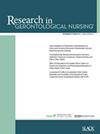社会参与在老年人健康中的作用。
IF 1.1
4区 医学
Q3 NURSING
引用次数: 1
摘要
本研究的目的是利用国家健康和老龄化趋势研究的数据,探讨社会参与与老年人的健康状况、认知和感知幸福感之间的关系。采用描述性统计、聚类和回归模型对数据进行分析。我们使用回归模型来确定代表性变量与参与者参与社会活动的程度之间的统计显著关系。选择三个集群中最具代表性的变量并拟合到回归模型中,该模型由(1)急性健康问题和事件,(2)认知和沟通障碍以及(3)影响长期健康状况的慢性疾病组成。一个回归模型发现两个因素——认知和沟通障碍以及影响长期健康状况的慢性疾病——在决定老年人的社会参与方面具有统计学意义。卫生保健提供者在规划和实施能够积极吸引老年人的社会项目时应考虑各种因素。[老年护理研究,xx(x), xx-xx.]本文章由计算机程序翻译,如有差异,请以英文原文为准。
The Role of Social Engagement in Older Adults' Health.
The purpose of the current study was to explore the association between social engagement and the health status, cognition, and perceived well-being of older adults using data from the National Health and Aging Trends Study. Descriptive statistics, clustering, and regression modeling were performed to analyze the data. We used the regression model to identify statistically significant relationships between the representative variables and the extent to which participants participated in social activities. The most representative variable for each of the three clusters was selected and fitted to the regression model, which consists of (1) acute health problems and events, (2) cognitive and communication barriers, and (3) chronic conditions contributing to long-term health status. A regression model found that two factors-cognitive and communication barriers and chronic conditions contributing to long-term health status-were statistically significant in determining social engagement in older adults. Health care providers should consider various factors in planning and implementing social programs that can positively engage older adults. [Research in Gerontological Nursing, xx(x), xx-xx.].
求助全文
通过发布文献求助,成功后即可免费获取论文全文。
去求助
来源期刊

Research in Gerontological Nursing
NURSING-
CiteScore
2.30
自引率
6.20%
发文量
44
审稿时长
>12 weeks
期刊介绍:
Research in Gerontological Nursing is a forum for disseminating peer-reviewed, interdisciplinary, cutting-edge gerontological nursing research and theory to investigators, educators, academicians, clinicians, and policymakers involved with older adults in all health care settings. The Journal accepts manuscripts reporting research, theory, integrative and systematic reviews, instrument development, and research methods with the aims of improving the wellness and quality of care of the older adult population. Theory papers should advance gerontological knowledge, and integrative reviews should provide an analysis of the state of the science and provide direction for future research.
 求助内容:
求助内容: 应助结果提醒方式:
应助结果提醒方式:


